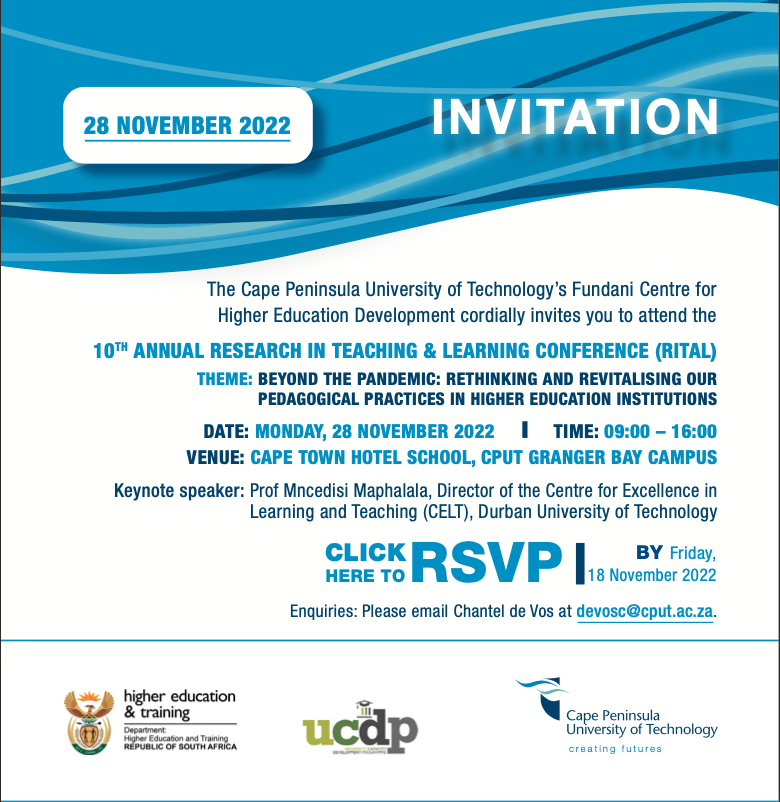
Click here to RSVP.

Click here to RSVP.
In this post I chat to Dr Najwa Norodien-Fataar, chair of the RITAL (Research in Innovation Teaching and Learning) organising committee and Head of Department at Fundani CHED’s Curriculum Development Unit. She shares snippets of her academic journey and reveals the integral role that RITAL and RIFTAL – the fund that makes research in this field possible – have played.
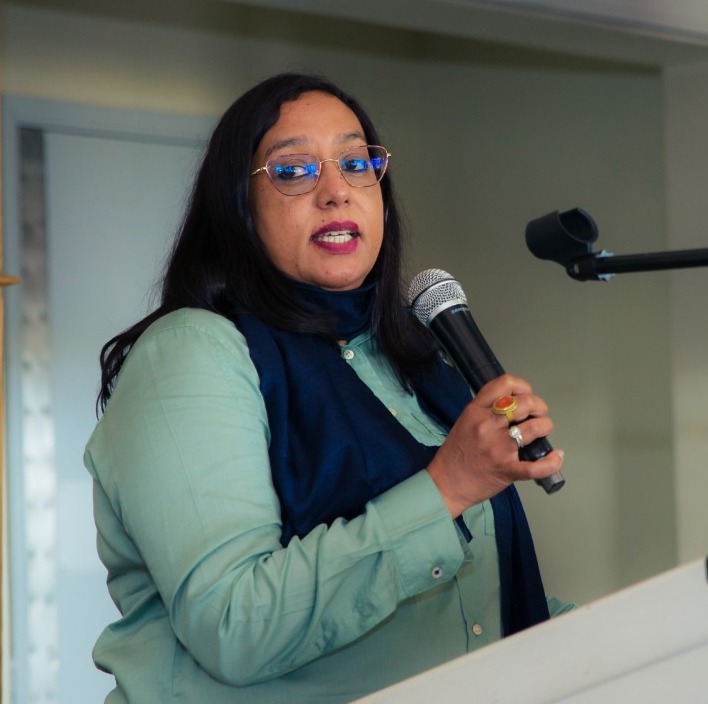
Najwa’s story starts in 2010 when the very first RITAL Conference was held. Not only was she one of the conference’s first presenters, she was also awarded best paper! Here she shares some tips for delivering an award-winning presentation. It’s no wonder that she now heads up both the organising and funding arms of RITAL.
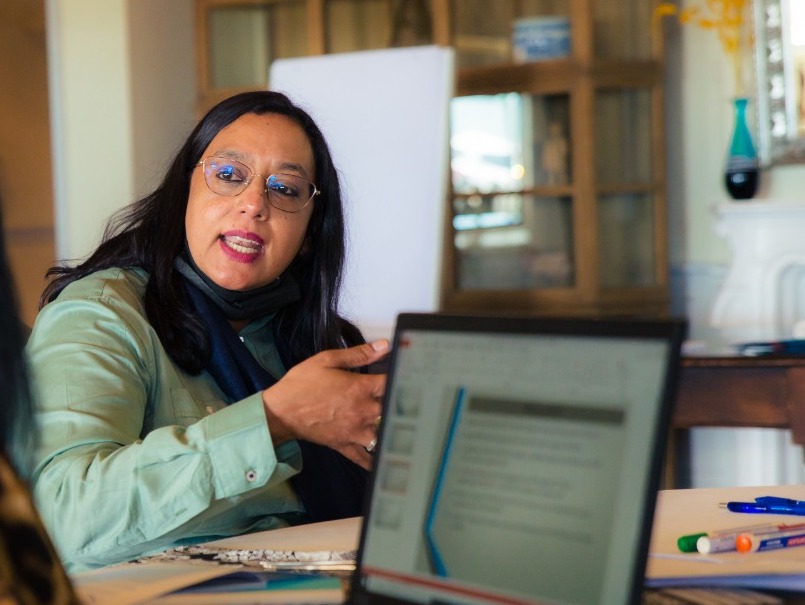
Within two years of presenting her first-ever academic paper at RITAL, Najwa submitted it to the South African Journal of Higher Education where it was published soon after. The focus of her research was student engagement at CPUT as it relates to their on-campus stay and use of digital tools. Najwa explained that 10 years ago the need for e-mentoring already existed, made especially necessary by Fundani’s position outside the CPUT structures of faculties and student residences. She discovered that students who felt more socially connected did better academically.
Najwa’s ability to secure RIFTAL funding for her research and her success at presenting lit an academic flame that burns brightly to this day. While her research focus has shifted slightly to focus more on the experiences of CPUT lecturers as opposed to students, the common thread between her academic interest then and now is her agency and capacity to develop programmes and serve. Her initial insights served students; more recently they serve the academics who engage with those students.
“We have to keep up. We’re on this threshold that requires us to change the way we learn, the way we view students. And I’m sure lecturers have done something extraordinary.”
Dr Najwa Norodien-Fataar
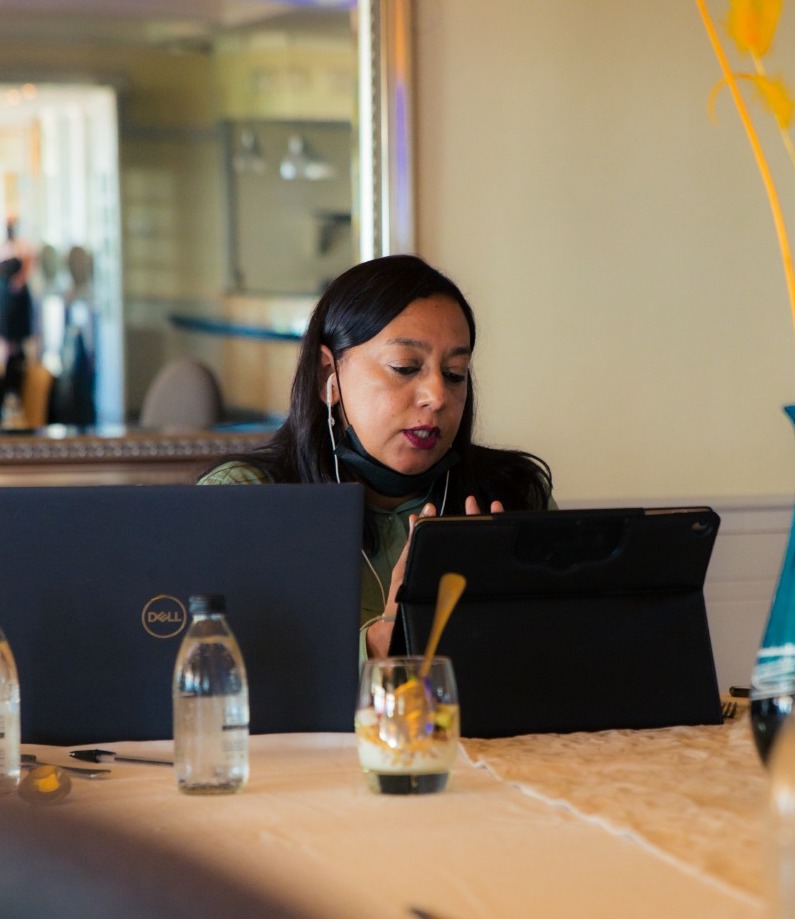
This confidence in lecturers’ capacity to innovate, especially in the past two years, is what excites Najwa for the upcoming 2021 RITAL Conference. In fact, she believes that the focus on digitally influenced pedagogy and lecturers’ experiences will continue into 2022. That will of course mark the 10th year celebration of RITAL as well as its first hybrid iteration. Having presenters and participants join in person as well as from their homes anywhere in the country or the world is an exciting prospect. And a daunting one. But Najwa is convinced that last year’s success with RITAL’s very first virtual iteration bodes well for the organising committee’s future endeavours.
If you’re presenting at the 2021 RITAL conference in two weeks’ time, be sure to take a look at these Tips for Presenting by Najwa. Also check out her numerous publications here.
9th Annual Research in Teaching and Learning (RITAL) Conference Call for Papers
Date: Thursday 25 November 2021
Time: 9h00–16h00
Online virtual conference: Microsoft Teams
The RITAL conference will bring together academics across the disciplines who are interested in discussing institutional, curriculum and pedagogical adaptations during and beyond the COVID-19 pandemic.
Theme: Post-pandemic challenges in higher education: Integrating pedagogy and technology-enhanced teaching and learning practices
The RITAL conference will enable academics to redefine, rethink and re-imagine our roles as lecturers at a university. The rapid shift to emergency remote teaching (ERT) meant that lecturers had to re-learn and adopt new ways of teaching. A combination of synchronous and asynchronous teaching approaches became vital during the COVID-19 pandemic, indicating lecturers’ capacity and openness towards innovation and technology-enhanced learning opportunities. As lecturers moved their content online via the learning management systems (LMS), a key concern was the pedagogical adaptations made during the ERT.
The RITAL conference will allow academics to discuss the integration of pedagogy and technology-enhanced teaching and learning related to these key questions:
How does the transition to ERT influence lecturers’ pedagogical strategies?
How does ERT affect student learning and the social relationships of learning?
How do institutional responsiveness and strategies impact teaching and learningduring the pandemic?
How do lecturers deal with the social inequities of our socio-cultural and educational landscape, such as students’ lack of data and digital technology, students’ motivation to learn and students’ lacking basic resources such as food and electricity?
How does technology-enhanced learning influence our perspective of decolonisationin higher education?
How can technology-enhanced learning lead to transformative learning among our students?
Empirical studies, reflections and conceptual papers will be considered. Academic staff and postgraduate students are invited to submit abstracts that focus on post-pandemic challenges in higher education under any of the following conference sub-themes:
Academic support staff are also encouraged to participate, e.g., the Student Counselling Unit, The Disability Unit, HIV AIDS Unit, and the Community Engagement Unit.
IMPORTANT DATES:
Submission of abstracts: 2 November 2021.
Notification of acceptance of abstracts: 8 November 2021.
Abstracts of 200-250 words for online presentations.
For questions, please contact Najwa Norodien-Fataar and Nicolene Pasquallie
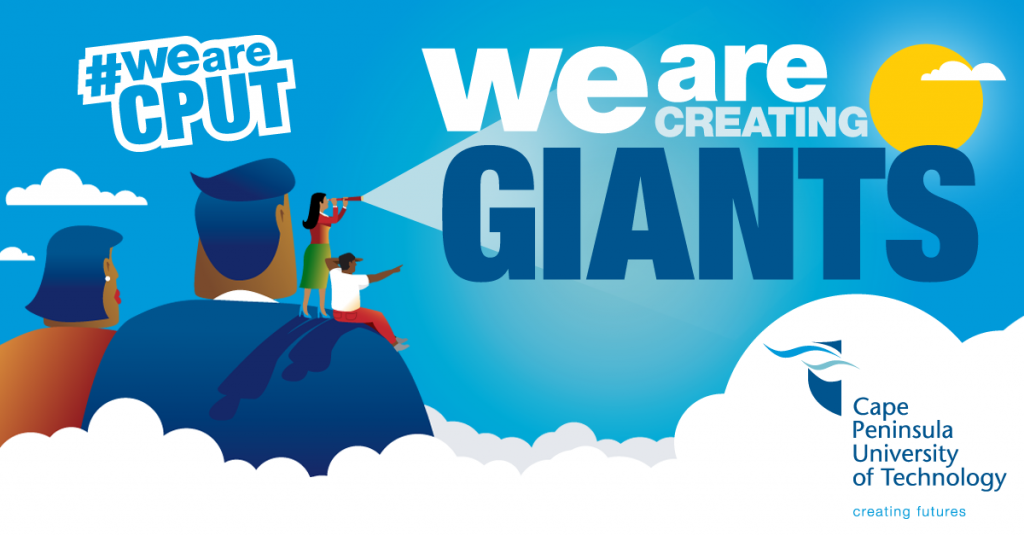
We are creating giants | Sikhulisa iinganga | Ons skep reuse
Have you, like so many of us, gotten used to the fact that English is the default language of academia? Do you have knowledge of another language, perhaps even more knowledge and fluency in that language than English? Even if you consider yourself monolingual, can you imagine what it’s like to forge creative and convincing arguments in a language you are not most comfortable in?
With these questions in mind the Language Working Group (LWG) has launched a campaign that celebrates the academic achievements of CPUT graduates and postgraduates in spite of or because of multilingualism.
Featured in this blog and on CPUT’s official YouTube channel are the experiences and research foci of graduate and postgraduate students from each of our faculties. Read more about these giants here. And click here for their videos.
#WeAreCPUT
#CreatingFutures
#CreatingGiants
We hope you are well and looking forward to the 2021 academic year. To support you in preparing your courses, CIET will offer a range of webinars. Please find the descriptions below.
You can register for these webinars using our online booking form: https://forms.gle/8kp5YN7qdsPJX9mt6
Blackboard assignment tool and Safeassign
Date: 25th of Feb 2021, 14.00-15.30
Facilitators: Janine Lockhart, Library Services, Sonwabo Jongile and Dr Faig Waghid, CIET
In this webinar, we will focus on two main areas on our LMS Blackboard: Online Assignments and the Plagiarism prevention tool, SafeAssign. Online assignments will focus on the creation and submission of online assignments, as well as how you as the lecturer can do the marking of the assignments online, by making use of Blackboard’s inline marking tools (commenting tools) and the interactive rubric (grading form).
We will then focus on the plagiarism prevention service Safe Assign, built into Blackboard, that allows you to protect the originality of work and ensure a fair playing ground for all of your students. SafeAssign prevents plagiarism by detecting unoriginal content in student papers within your existing teaching and learning environment. SafeAssign can also further deter plagiarism by creating opportunities to educate students on proper attribution and citations while properly leveraging the wealth of information at their disposal. Janine Lockhart from the library will contribute to the discussion on how to use information ethically.
How to set higher-order multiple-choice questions and performance-based assessments
Date: 4th of March 2021, 14.00-15.30
Facilitators: Ass Profs Eunice Ivala and Daniela Gachago, CIET
How to design and implement secure and reliable assessments has been one of the most difficult tasks in the remote teaching and learning experience last year. This webinar will unpack some of the issues with assessment, discuss how to set higher-order multiple-choice questions, and offer alternatives to exams, such as more performative oriented, peer and self-assessments to counter the challenge of plagiarism in exams.
Blackboard and Respondus assessments
Date: 11th of March 2021, 14.00-15.30
Facilitators: Sonwabo Jongile and Mvuyisi Mavela, CIET
This session will introduce the creation and management of online assessments both in Blackboard and in Respondus. We will discuss opportunities and challenges using either of the tools. Online assessments created offline in Respondus can be printed and published directly to Blackboard, whereas those created directly in Blackboard are all set to be deployed into the content area. While no purely online assessment system can prevent cheating, practical tips on safe and authentic contexts for managing online assessment either through Respondus or Blackboard will round up the session.
Blackboard Collaborate / Engagement tools
Date: 18th of March 2021, 14.00-15.30
Facilitators: Ass Prof Daniela Gachago and Dr Faig Waghid, CIET
Last year saw a rapid uptake of synchronous online communication tools, such as Blackboard Collaborate and MS Teams. This webinar will demonstrate the use of Blackboard Collaborate and introduce student engagement tools, such as polls and Breakout Rooms in Collaborate. We will also showcase other tools, such as Google Jamboard and Padlet for creative brainstorming.
Structuring content on Blackboard (including adaptive release)
Date: 25th of March 2021, 14.00-15.30
Facilitators: Sonwabo Jongile and Mvuyisi Mavela, CIET
The ability to design how lecturers teach and students learn has been one of the most crucial aspects of the success of remote teaching and learning. This includes how to structure your online content delivery to guide students in their learning journey. How you design and structure your content in a way that is easy to follow, navigate, and appropriate for your subject will be the focus of this webinar. We will demonstrate tools and possibilities that our LMS has to offer in terms of structuring content on Blackboard, such as adaptive release.
Learning design workshop
Dates: 2nd of March 2021 and 9th of March 2021 (repeat), 14.00-16.00
Facilitators: Ass Prof Daniela Gachago and Dr Faig Waghid, CIET
In this learning course design online workshop, you will work on the design of one of your courses you are teaching in 2021. The workshop will help you to create an active and responsive learning experience for students based on Laurillard’s six ways of learning. We will take you through a short learning design process, aligning learning outcomes, activities, and assessments. For this workshop, you will need stable internet access, a mic, and access to a laptop or desktop.
You can register for these webinars using our online booking form: https://forms.gle/8kp5YN7qdsPJX9mt6
21 February is one of the days we look forward to every year as the Language Working Group (LWG) because it is a celebration speaking the language(s) you grew up with. Our goals for a more inclusive and multilingual academic space lines up with those of UNESCO and their observance of International Mother Language Day. They are committed to leaving no one behind and believe that this can be done through a focus on language and multilingualism.
Since February is also the month of love, the LWG members wanted to share our personal language stories to show that inclusion and a love for language really is at the heart of what we do and who we are.
These three questions were posed to each of my colleagues. Here is what they said:
1. How and/or when did you become interested in language work?
2. What is your greatest dream for language at CPUT, regardless of how impossible it seems?
3. Do you have a message for CPUT students regarding language?
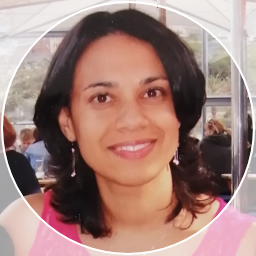
Lizel Hudson
Coordinator: Work-Integrated Learning and Language since 2018
Faculty of Health and Wellness Sciences
Why language?
My interest in language support and academic language development was sparked when I started my lecturing career in 2016. As an Afrikaans speaker with a rural background, I could relate to students for whom English was not their first language, even more so when they were asked to write ‘Academic English’. As I developed my own English speaking and writing abilities, it came natural to pass my discoveries and understandings on to my students.
My dream for CPUT
Firstly, I would like students to feel comfortable enough to ask any content or concept to be repeated in a language that they are comfortable with…I say repeated because they will hear and apply the concept in a very ‘English-driven’ world of work.
Secondly, I would like staff (academic, admin and support) to assist students in language(s) that they are comfortable with. I think such a dialogue will break barriers and misconceptions about language, and more specifically the academic and scholarly use of language. I want both staff and students to feel that their ‘voice’ counts – no cliché intended.
My message for CPUT
Be brave enough to ask that something can be repeated in a language that you can relate to. The penny will drop if you can relate what seems to be a foreign concept to something that you already know, because believe me, you enter our classroom doors with a wealth of knowledge! Help us to help you make connections with what you already know, to what you need to learn to become an efficient professional.
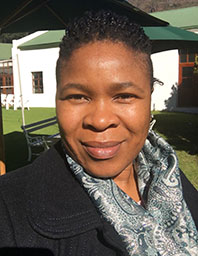
Linda Manashe
Courseware developer since 2011
Centre for Innovative Educational Technologies (CIET)
Why language?
I first did language work in 2012 when my office started the Online Multilingual Glossaries project, which became a beautiful collaboration with the Language Unit in Fundani (CHED) the following year – 2013. CIET and Fundani have worked together to create 15 verified online multilingual glossaries. These glossaries cover various academic study fields across CPUT faculties to provide translated and verified academic concepts and terminologies in Afrikaans English and isiXhosa languages.
My dream for CPUT
My greatest dream for language at CPUT is the realisation of the students’ right in choosing their language of instruction, and the actual provision of those language resources and relative language services, especially to students for whom English is not a first language.
My message for CPUT
I wish all students of CPUT to embrace their different languages, invest in their mother tongues, learn from and empower each other through the diverse languages in our student community.

Ignatius Khan Ticha
Coordinator: Language since 2015
Faculty of Applied Sciences
Why language?
All of my education has been in English Studies which led me to language work in higher education. While teaching academic literacy skills in English, I have always found the need to create space for the teaching and learning to happen in languages other than just English, that is, the need for multilingualism. I have found that there are ways to do this even when you master just the basics of languages that students speak (other than English) and so I continue to derive great joy in coordinating initiatives that promote this multilingual vision and offer support to staff and students in that respect. Also, when I first joined CPUT, I sought to take a course in isiXhosa but could not find one on campus. It is my desire to continue doing the work I do to ensure that new colleagues joining my Faculty do not find themselves in the position I was some 12 years ago – wanting to learn a language that would have added value to my practice but not having that opportunity afforded to me.
My dream for CPUT
That someday, all students and all new staff who do not speak isiXhosa and Afrikaans would be required to take a course in these languages, at least at a basic conversational level as part of their induction into the university community.
My message for CPUT
That they should read the institutional language policy and national language policies and guidelines to understand their language rights and to seek the respect of these rights – even at a basic level.
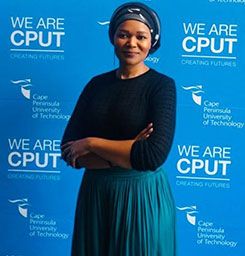
Nomxolisi Jantjies
Language Specialist since 2016
Language Unit, Fundani CHED
Why language?
At university and this is where I learned that language is more than just a means of communication. It is closely tied to who we are and how we would like to be perceived by others. Also, our (South African) history has taught us that language can be used misused as an exclusionary tool from socio-economic activity. This has largely influenced my decision to remain in a language-related field. My work background has always involved languages and contributing to the development of South African languages as languages for learning and teaching.
My dream for CPUT
Seeing all South African languages enjoying the same status at the institution.
My message for CPUT
Learn a new language. Adding a language to your repertoire is always an advantage.
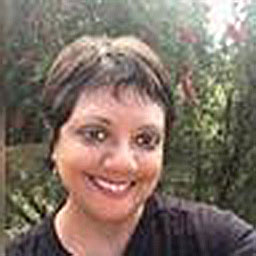
Ayesha Reiners
Engineering Communications Lecturer,
Coordinator: Level 1, Language, and Transformation since 2016
Faculty of Engineering
Why language?
I was raised in a multilingual home. The rich culture and diversity of language in our home gave me an identity that is priceless. I soon became aware that language was (and is) a social tool. As a young adult, I became very aware that language was much more than Communication. It was also strongly related to identity and power.
I was an avid reader and this introduced me to the multilingual and multicultural nature of language. Reading took me to different places. It moved me out of the narrow context of the Apartheid regime of that time. This curiosity and incite led me to study Arts with a focus on language and literacy at University. The central role of language in everything we do is something I will always advocate.
My dream for CPUT
My wish is that language is not seen as a deficit to learning, but as a rich tool for engagement and agency. In addition that all languages be respected and appreciated for the rich culture it comes from. When we hear our own language being spoken, it gives us an undeniable feeling of belonging and comfort. My dream is that all role players at CPUT can communicate in many different languages so that we create a safe, nurturing environment for all.
My message for CPUT
Language is not only a key to communication, it is also a key to our identity. Be proud of who you are! And READ as much as you can!
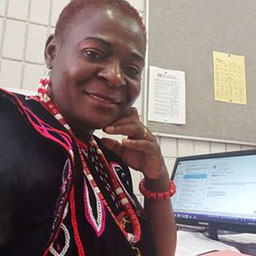
Jane-Francis Afungmeyo Abongdia
Senior Lecturer
Acting Coordinator: Language since 2019
Faculty of Business Sciences
Why language?
I started as an English language teacher in 1997, then in 2007 I registered for my Honours in Linguistics at UWC and subsequently, my Masters. I finally obtained my PhD in 2013. Since then I have been teaching linguistic courses and communication studies while supervising Masters and Ph.D. students.
My dream for CPUT
I am hoping to host an international conference in 2021 where academics will have the opportunity to present and publish their articles in DHET accredited journals.
My message for CPUT
Language is important in all that you do as students. It defines who you are and where you come from.
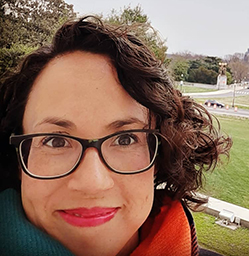
Alexa Anthonie
Language Specialist since 2019
Fundani CHED
Why language?
My earliest memory of my commitment to language – that it offered me beauty and an escape – was the night before my Matric Biology paper. Instead of studying biology, I was drawn to my prescribed textbook for English, The Great Gatsby. I pulled an all-nighter finishing that instead of studying for my exam! It showed a terrible lack of discipline (Don’t try this at home!), but it definitely showed me that I needed to make a life, a living, in words. I pursued degrees in Linguistics and worked in publishing before finding my way back to academia. Today I’m living my best life as a language professional and activist for language inclusion and language pride.
My dream for CPUT
I would love to see technology advance to the stage where diverse language speakers can be in a lecture hall and speak to the lecturer and each other in the language(s) they are most comfortable with and be instantly understood by everyone. Now there’s a challenge for all CPUT engineers!
My message for CPUT
A little bit goes a long way. Fluency in a language is great and should be strived for, but if “Ndiyayizithanda inwele zakho!” (I like your hair!) or “Jy lyk fantasties!” (You look great!) are all you can manage, then say it, and say it with pride!
In celebration of International Mother Language Day 2021, Dr Ignatius Ticha, a member of the Language Working Group and Faculty Language Coordinator of Applied Sciences, is hosting a virtual event aimed at sharing multilingual practices in CPUT classrooms. The event will feature praise singing, a student discussion panel and presentations from our own scholars and one as far afield as Rhodes University.
The Language Unit sat down with Dr Ticha to find out what inspired him to host the event and choose the scholars lined up to speak there.
1. What inspired you to host a presentation and panel discussion to celebrate International Mother Language day?
I wanted to expose members of the faculty community to scholarly insights on the subject of multilingualism and language diversity but also to create space for colleagues who themselves create space for multilingualism in their teaching and assessment practices so that they can share them with the rest of us. In this way colleagues would not only be exposed to the possibility of practicing multilingualism in the CPUT context but would also see examples of how to do it.
2. Can you say a little more about the presenters you’ve invited?
Dr Docrat is Rhodes University’s first post-doctoral research fellow in forensic linguistics (language and law), under the auspices of the NRF SARChI Chair in the Intellectualisation of African Languages, Multilingualism and Education. Dr Docrat has presented at international and national conferences and she has published widely in accredited national and international journals and books.
Sisanda Nkoala is a lecturer in Journalism, Faculty Informatics and Design at CPUT.
Michael M. Paulse is a lecturer in the Faculty of Health & Wellness Sciences at CPUT.
3. Why were you drawn to invite these speakers?
I was drawn to the quality of research undertaken by Dr Docrat in the area of multilingualism in the educational and legal sectors.
Ms Nkoala and Mr Paulse’s exemplary practices have revealed the possibilities and opportunities that exist for multilingual teaching and assessment in the CPUT context. I was exposed to the work they do through presentations that they gave at the CPUT Language Indaba 2020.
4. Can you explain the importance of having a praise singer at the event?
Since the praise singer transmits social consciousness, it is my hope that he would raise the consciousness of participants around the issue of the mother tongue and language rights, while simultaneously entertaining the audience. The praise singer, Sinesipho Yekiwe is a student at CPUT and was referred to me by Student Affairs for the Faculty’s International Mother Language Day event in 2020. His performance was received with great acclaim by the audience
5. Why do you involve students in your event?
Creating a multilingual space would improve the experiences of students. As the main stakeholders at the university, it is important that their voices are heard on their language experiences but also on how to work towards an improved language experience at CPUT.
6. What message do you hope colleagues and students will take away from this event?
I hope that participants would be exposed to existing scholarship on the subject and more particularly, the value of a multilingual higher education. Additionally, they would be shown in practical ways how colleagues at CPUT are engaging in multilingual teaching and assessment.
2nd Call for Papers
2 and 3 December 2020
Time: 9h00 -12h00
Fundani CHED will be hosting its first Online RITAL conference via Microsoft Teams.
Theme: Institutional adaptations during the COVID 19 pandemic: Exploring staff experiences with Remote Teaching and Learning
The RITAL conference will bring together academics across the disciplines who are interested in discussing institutional, curriculum and pedagogical adaptations during the COVID 19 pandemic. The online platform will enable academics to explore how the rapid shift to online learning affected their teaching, including:
Empirical studies, as well as reflected work, will be considered. Academic staff and postgraduate students are invited to submit abstracts that explore educational adaptations during remote teaching and learning under any of the following conference sub-themes:
Academic support staff are also encouraged to participate, e.g. the Student Counselling Unit, The Disability Unit, HIV AIDS Unit, and the Community Engagement Unit.
IMPORTANT DATES:
Please complete the form below by 6 November 2020.
https://forms.gle/b6M5tWtrm6EN4Yjn6
For questions, please contact: norodien-fataarn@cput.ac.za and februaryd@cput.ac.za
Kind regards
Dr Najwa Norodien-Fataar
Senior Lecturer: Academic Staff Development Unit
You can now register for the 2020 Teaching and Learning with Technology Day
Date: Thursday, 26th of November 2020, 9.00-15.30
Location: online
Theme: Staff and student experiences of Remote Teaching and Learning during times of disruption – lessons learnt for an unknown future
COVID-19 has challenged institutions of higher learning to rethink the way they teach and how their students learn. CPUT like other institutions nationally and as mandated by government, adopted a multi-modal approach to teaching and learning using the carousel model in order to make sure that no student would be left behind. Over the last eight months, CPUT and its stakeholders gained invaluable experiences in supporting teaching and learning remotely. What were your experiences with RTL? What was made possible? What challenges did you encounter? In terms of student access? How did you handle security and privacy of student data? What inequalities were highlighted? How will these experiences impact on the future of higher education? Should we/can we go back to the way we taught before, or are we going to see more uptake of blended learning or fully online teaching and learning in the future?
The event will feature both staff and students’ reflection on their experiences with multi-modal learning during lockdown and suggest ways we can use the lessons learnt for planning for 2021 and beyond. They will share specific tools and technologies they used and specific pedagogical interventions that worked particularly well for their students’ teaching, learning and assessment.
To book your place please use our online registration form
For more information and the programme see https://blogs.cput.ac.za/edutech/2020-teaching-and-learning-with-technology-day/